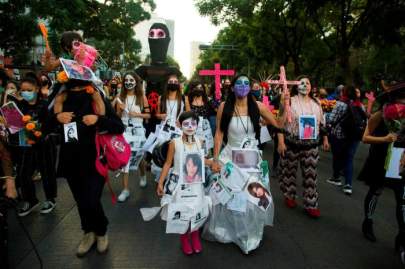Mexico’s political murders put focus on rising violence

It was a sunny afternoon in Ciudad Obregón, a town in northwestern Mexico. Abel Murrieta, running for mayor of the municipality of Cajeme, where the town is located, stood on a busy intersection by a shopping centre, clutching leaflets to canvas for votes in June 6 elections.
A man in a grey shirt and jeans walked up, took out a gun and pumped 10 bullets into the former state attorney-general, including two to his head, before crossing the street again and escaping in a waiting car as Murrieta lay on the pavement. Footage from official security cameras aired on television showed leaflets scattered and blood soaking his white shirt.
Murrieta was the 32nd candidate murdered in the run-up to election day, when Mexicans nationwide will elect 500 federal lawmakers, 15 state governors and thousands of mayors and local officials.
Since the election process began last September, 85 politicians have been murdered, including the 32 who had been running for office, according to Etellekt Consultores, which tracks campaign violence. That makes it the second bloodiest election on record, after the presidential vote in 2018.
According to Etellekt, most of the victims were candidates for mayorships from parties in opposition to the incumbents in those states. Their deaths have laid bare the deep-rooted ties between organised crime groups and the local officials who protect them.
“If you confront them, you get harassed or killed,” said Rubén Salazar, Etellekt director. “This is Mexican democracy at the local level . . . No one can run for office without the permission of the mayor and the local crime boss.”
Murrieta appears to have been no exception. In a posthumously released election spot, he proclaimed he was “serious about taking on crime . . . I’m not afraid”. Hours later he had been shot dead, the apparent aggressor captured on an official street security camera in the state where López Obrador’s former security minister is running for governor.
The political murders have underlined the challenges facing President Andrés Manuel López Obrador’s “hugs not bullets” strategy against organised crime, his new militarised federal police force and his repeated promises to deliver peace in a country where violence has been soaring for 15 years and there are nearly 100 murders a day.
Violence, which has been spiralling in Mexico since former President Felipe Calderón launched a catastrophic war on drugs in 2006, is Mexicans’ top electoral concern, dominating many races. A survey by El Financiero newspaper this month found two-thirds of people disagreed with López Obrador’s handling of the problem, with just 18 per cent approving.
Since 2006, the number of homicides has more than tripled. The government claims it has now contained the rise, reporting a 4 per cent drop in murders the first four months of this year compared with the same period last year.
But in April, there were 2,857 murders, 4 per cent higher than in April 2020, as well as 77 femicides — the murder of women because of their gender — a 13 per cent leap from the same month last year.
Mexico’s murders hit an all-time high in 2019, with 34,682 homicides and 970 femicides. Last year was little better: 34,554 homicides and 977 femicides. So far this year, there have been 11,277 homicides and 318 femicides.
Ricardo Márquez Blas, a former security official, said on a dozen occasions since López Obrador’s term began, the number of homicides had surpassed 3,000 a month, including femicides, compared with just three in the previous 2012-18 administration.
López Obrador, who took office in 2018, says he has taken a different tack by addressing the root causes of crime, offering young people jobs and scholarships instead of confronting cartels directly.
But critics say he, like past governments, has relied on the military instead of reforming state and local police forces in a country where officers earn around $600 a month, and half have to buy their own boots.
In a pointed criticism of Mexico’s strategy, former US ambassador Christopher Landau said López Obrador had adopted a “pretty laissez-faire attitude” towards drug cartels despite estimates that they controlled “anywhere from 35 to 40 per cent of the country”.
“He sees the cartels . . . as his Vietnam, which it has been for some of his predecessors, and so I think . . . he sees that as a distraction from focusing on his agenda,” he told an online seminar.
That recalled the “pax narca” — a tolerance for cartel activities provided they remained contained — that reigned while the Institutional Revolutionary Party (PRI) ruled Mexico from most of the 20th century.
“The president doesn’t want to take on El Narco,” said Salazar, using the Mexican term for drug cartels.
He said López Obrador, who is widely considered to be seeking to replicate the PRI’s centralised power, “doesn’t understand” that the old cohabitation had been shattered as new parties disrupt cosy criminal partnerships and spark new ones.
“The president doesn’t want to recognise that there’s a very big problem of narco politics in the country that is advancing with gigantic steps,” Salazar said, as politics and crime mix at the local level.
Analysts say the climate of polarisation is further inflamed by the president’s daily news conferences, where he delivers a barrage of criticisms against his political opponents and electoral authorities that he claims are biased.
“With all this polarisation, far from delivering on his promises of peace, he is giving us a more convulsed country,” said Gema Kloppe-Santamaría, an expert on crime and violence at the Loyola University in Chicago.
“López Obrador has polarised this election to the point of virtually declaring war on electoral institutions. My big worry is that what we’re seeing now won’t stop after June 6,” she said.
Source: https://atlantabusinessjournal.com/mexicos-political-murders-put-focus-on-rising-violence/




